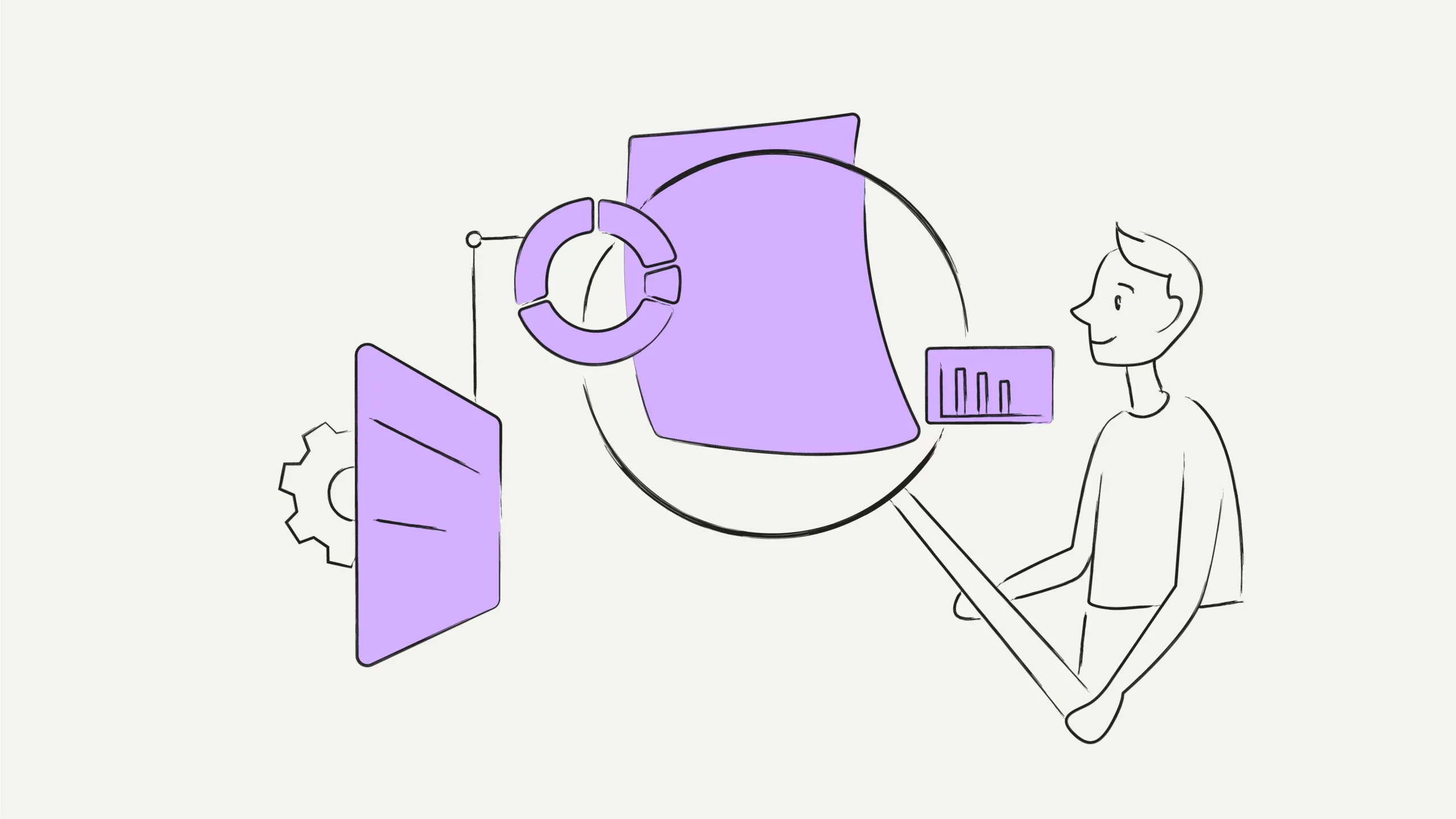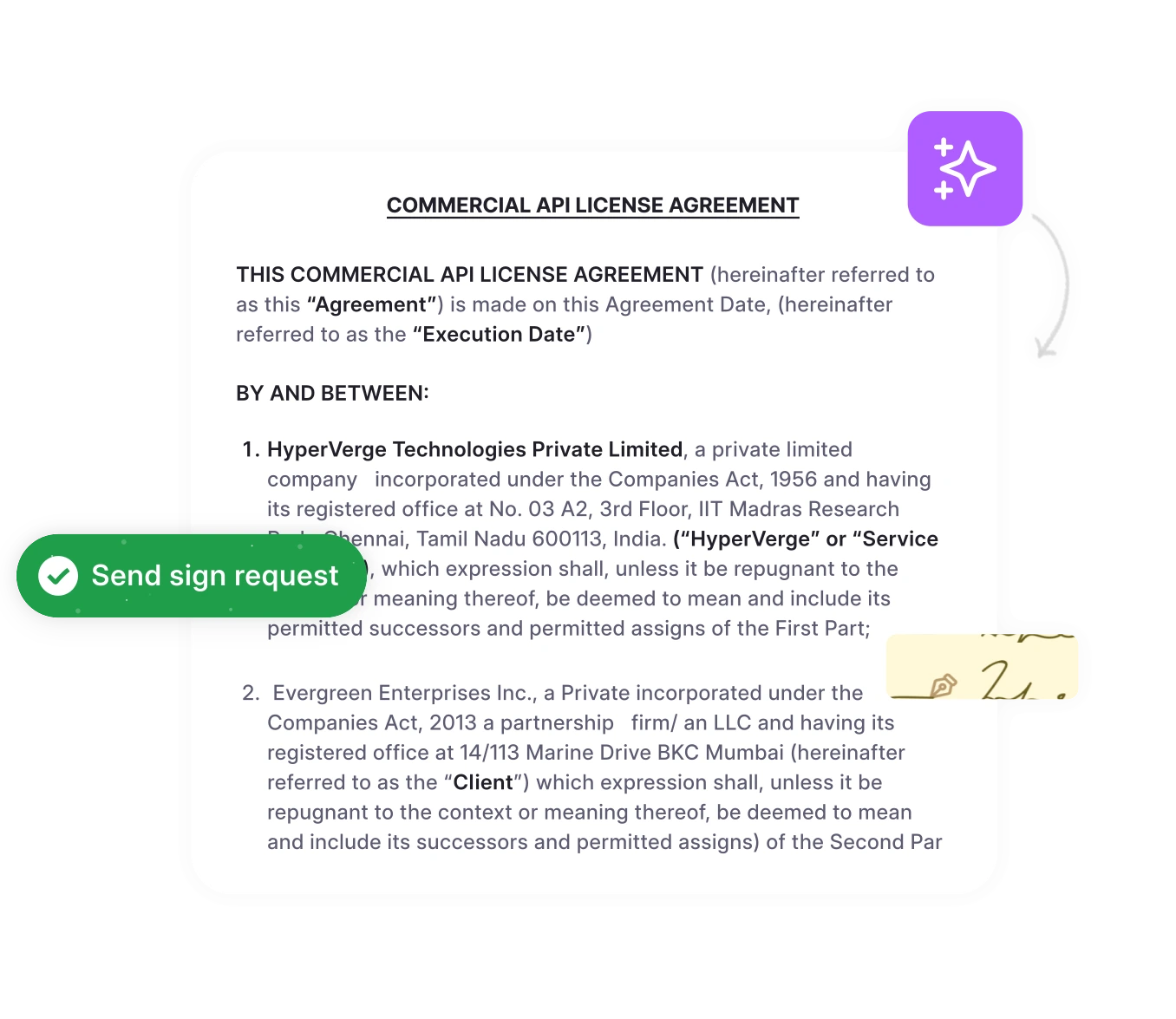Imagine drafting and reviewing a 100-page contract. When it is executed, it joins the thousands of contracts in your organization’s portfolio. Each contract dictates obligations, deadlines, and revenue opportunities. These terms are buried in unstructured language and get overlooked. Manually tracking them post-signature is humanly impossible.
The cost of not capturing the full potential of your contractual relationships can add up to almost 9% of your bottom line.
AI-driven contract intelligence analyzes large contract volumes and extracts insights to drive better business outcomes with speed and efficiency.
In this blog, we will cover how the transformative power of AI in contract management, the key components and benefits of contract intelligence, and how it works across industries and use cases.
What is contract intelligence?
Contract intelligence uses AI to transform static documents into dynamic intel to inform business decisions. This detects and assesses risk in contracts, evaluates terms against standard clauses, extracts, summarizes, and tracks this information precisely and efficiently. It promises faster contract review, advanced contract analysis, and automated contract obligation tracking, with minimal administrative overheads.
Legal teams can now trade:
- Mind-numbing contract reviews for AI-assisted summaries and redlining
- Administrative headache for auto-extracted metadata
- Hour-long manual spreadsheet searches for AI filters and searches
- Manual periodic reporting for real-time visual analytics dashboards
- Error-prone compliance reviews for pre-determined compliance protocols
- Grunt work that steals their precious mindspace for work that truly drives business
In short, contract intelligence makes life easy for legal teams and ultimately drives business.
7 functionalities to look for in contract intelligence software
Contract intelligence software offers a range of key functionalities that streamline the management, analysis, and optimization of contracts, ensuring businesses can operate more efficiently and with reduced risk. Here are the 7 important functionalities.
1. Auto-extracted metadata
The automated extraction process transforms raw contract text into structured, actionable data that can be easily searched, analyzed, and reported.
Using advanced AI algorithms, particularly Natural Language Processing (NLP), contract intelligence tools dissect contracts to identify and extract critical information vital for legal teams, contract managers, and business decision-makers.
These tools can precisely pinpoint and extract essential data points, including:
- Contractual parties: Names, roles, and affiliations of all involved entities, ensuring clarity on responsibilities and relationships.
- Dates: Start and end dates, renewal dates, milestones, and deadlines, providing visibility into contract timelines.
- Monetary values: Contract value, payment terms, fees, penalties, and other financial details that are crucial for financial oversight and budget planning.
- Obligations and responsibilities: Duties, deliverables, service level agreements (SLAs), and performance metrics, helping ensure compliance with contractual obligations.
- Risk factors: Indemnification clauses, limitation of liability, termination provisions, and force majeure clauses, enabling proactive risk management.
Example: A contract intelligence system can extract the exact start and end dates of a complex IT service agreement, ensuring timely renewals and avoiding lapses in service. It can also identify all non-compete clauses across a company’s entire contract portfolio, safeguarding the organization from potential legal disputes.
2. Proactive risk management
Risk assessment is a critical function of contract intelligence software. By analyzing contract terms against a vast database of legal and compliance standards, these systems proactively identify potential risks. This proactive approach is a significant departure from traditional, often reactive, risk management methods.
Contract intelligence platforms can flag a multitude of potential risks, including:
- Financial risks: Overly generous indemnification clauses, unfavorable payment terms, or exposure to significant financial penalties.
- Legal risks: Ambiguous contract language, potential for disputes, conflicts with existing contracts, or violations of antitrust or competition laws.
- Compliance risks: Breaches of data privacy regulations (GDPR, CCPA), labor laws, or industry-specific compliance standards (HIPAA).
- Operational risks: Service level agreement (SLA) breaches, inadequate insurance coverage, or supply chain disruptions.
Example: Consider a scenario where your company is negotiating a new vendor contract. The contract intelligence software identifies overly broad indemnification clauses, which could expose your business to significant financial liabilities. It also flags clauses that violate GDPR data privacy regulations due to improper handling of personal information. By catching these issues early, your legal team can renegotiate the terms, mitigating potential risks and ensuring compliance with regulatory standards.
When implementing AI into your contract management processes, pilot with a small subset of your contracts. You can fine-tune the system, train your team effectively, and measure the initial impact before you scale. This phased approach can ensure a smooth transition and greater success in adopting the new technology.
3. Compliance monitoring
Compliance monitoring ensures ongoing adherence to both contract terms and external regulations. This proactive approach to compliance involves continuous tracking of contract performance metrics, identifying potential breaches, and generating alerts for imminent issues.
By analyzing contract data against predefined compliance standards, the software can:
- Track performance metrics: Monitor key performance indicators (KPIs) such as on-time delivery, service level adherence, and payment compliance.
- Identify breaches: Detect instances where contract terms are violated or regulatory requirements are not met.
- Generate alerts: Proactively notify relevant stakeholders of potential compliance issues, enabling timely corrective actions.
Example: A contract intelligence system monitors a key supplier’s on-time delivery. When repeated delays occur, the system alerts your team, allowing for quick renegotiation or alternative sourcing. The software also scans contracts for GDPR compliance, flagging any data protection issues to ensure regulatory adherence.
4. Contract performance analytics
Performance analytics is the process of measuring the effectiveness and efficiency of contracts within an organization. By analyzing contract data, businesses can gain valuable insights into the performance of their contract portfolio.
Contract intelligence software enables organizations to evaluate key performance indicators (KPIs) such as:
- Cost savings: Identifying contracts with favorable terms, quantifying cost reductions, and benchmarking against industry standards.
- Revenue generation: Assessing the commercial impact of different contract types, identifying underperforming contracts that lead to revenue loss, and exploring opportunities for optimization.
- Contract efficiency: Measuring contract cycle times, error rates, and resource utilization to optimize contract management processes.
Example: A business uses advanced contract analytics to identify suppliers with higher cost savings, prioritizing future contracts with them and renegotiating less favorable ones. The software also flags underperforming contracts, enabling the company to address inefficiencies through renegotiation or termination.
5. Automated renewal tracking
Renewal management involves tracking contract expiration dates, proactively managing renewal processes, and optimizing contract terms. Contract intelligence software plays a pivotal role in streamlining this process.
By extracting and analyzing contract data, the software can accurately determine contract expiration dates and create a centralized repository for this information. This enables organizations to:
- Set reminders: Generate timely notifications for contract renewals, allowing sufficient time for negotiation and decision-making.
- Automate renewals: For standard contracts with predictable terms, the software can automate the renewal process, reducing manual effort and minimizing the risk of missed renewals.
- Optimize renewal terms: Analyze contract performance data to identify opportunities for renegotiation, cost reduction, or service enhancements during the renewal process.
Example: Intelligent contracts can be automated with notifications alerts 30/60/90 days before they expire. This allows relevant stakeholders to review terms, assess performance, and initiate renewal negotiations, proactively. This prevents unexpected contract lapses and ensures business continuity.
6. AI-Search and filters
Search and retrieval is a core functionality of contract intelligence software. It empowers users to locate specific contracts or clauses within a vast repository of legal documents.
Leveraging AI-powered search capabilities, these platforms enable users to:
- Conduct natural language searches: Users can employ everyday language to find relevant contracts, eliminating the need for precise legal jargon.
- Utilize advanced filtering options: Refine search results based on various criteria such as contract type, parties involved, dates, or specific clauses.
- Extract key information: Quickly identify specific data points within retrieved contracts, such as contract values, performance metrics, or termination dates.
Example: A legal professional can easily find a service level agreement (SLA) by searching for the term “service level agreement.” The system can then further refine the results based on specific criteria, such as the client name or contract value.
7. Contract analytics
Predictive insights transform contract data into actionable intelligence by forecasting future trends, identifying potential risks, and uncovering hidden opportunities. This capability is made possible with advanced analytics and machine learning algorithms on historical contract data.
By analyzing vast amounts of contract information, contract intelligence software can:
- Predict contract performance: Forecast renewal rates, contract values, and dispute likelihoods.
- Identify potential risks: Detect clauses that could lead to legal disputes, financial losses, or compliance issues.
- Uncover hidden opportunities: Discover cost-saving measures, revenue enhancement possibilities, and new business avenues.
Example: An AI-powered CLM system might predict a high likelihood of contract disputes based on historical data related to specific contract clauses or counterparties. This early warning enables organizations to proactively address potential issues and mitigate risks. Similarly, the software could identify contracts with high renewal rates and profitability, providing insights for targeted upselling or cross-selling opportunities.
Unlock full contract potential
Don’t let critical intelligence stay buried in contracts. Turn static documents into strategic assets with AI.
Book a Demo7 benefits of contract intelligence solutions
Implementing contract intelligence software brings several advantages, transforming how organizations manage contracts and mitigate risks. Here are seven key benefits to consider.
1. Automates metadata entry and extraction
Manual contract data management is tedious and prone to errors. AI, on the other hand, automatically identifies and extracts key information from contracts, reducing human error and ensuring data accuracy from start to finish.
Contract metadata can be centrally tracked across tools and business systems, speeding up contract lifecycle management from creation to execution to renewals. This frees up your legal teams to focus on more strategic and complex tasks, like risk assessment, negotiation, and relationship management.
2. Maintains compliance and manages risks more effectively
Contract analysis software helps stay vigilant about contract terms against regulatory requirements. It proactively identifies potential contract compliance issues, such as data privacy violations or labor law breaches. Analyzing and flagging risk clauses enables early risk mitigation.
By highlighting areas of concern, like indemnification or termination clauses, you can assess your exposure, negotiate better terms, or take steps to mitigate risks, protecting your organization’s financial interests and legal stance.
3. Saves cost and maximizes revenue opportunities
AI contract intelligence solutions uncover unfavorable terms and excessive fees. You can then identify renegotiation opportunities, ensure that agreed-upon contractual obligations are fulfilled, and revenue leaks are safely plugged.
As a reservoir of financial data, contracts dictate the financial information of the organization. Contract analytics helps you capture revenue streams that are overlooked.
4. Enhances decision-making with comprehensive data insights
Contract analytics platforms transform raw data into actionable insights. They reveal patterns in contract performance like average contract value, renewal rates, and compliance status.
A comprehensive, portfolio-wide visibility helps set clear objectives, allocate resources, prioritize initiatives, and plan strategically.
5. Enables negotiations with AI
Intelligent contract review helps identify optimal negotiation points. They suggest alternative terms against precedent clauses and contract language that your organization prefers. This can remove up to 70% of your contract review time while you focus on
Combined with version control and central audit logs, contract management machine learning systems make negotiations a breeze. You don’t have to shuttle between tools and systems to establish context. You are in a better place to close that deal again confidently.
6. Uses predictive analysis and forecasting
While not all contract intelligence platforms claim to offer predictive analytics capabilities yet, they do have the ability to track trends and patterns across your contract portfolio.
Artificial intelligence contract analysis on metadata like contract terms, values, and performance helps project renewal rates and risk appetite.
7. Ensures scalability and flexibility for growing needs
The CLM partner you evaluate has got to be equipped to grow with you in the long haul. Honestly discuss ramping up contract volumes and integrating with your business systems like email, Slack, CRM, and productivity suites.
With a unified view of your obligations and operations across functions, this can also benefit teams across the organization.
Contract intelligence benefits for other business teams
Contracts are no longer static documents that gather dust in filing cabinets. Contract intelligence software can help you transform them from administrative overheads into a strategic advantage.
| Team | Benefits |
| Legal | Accelerated reviews, lower risk |
| Procurement | Supplier compliance and vendor contract performance monitoring |
| Finance | Identify hidden revenue opportunities and leakage |
Contracts are no longer static documents that gather dust in filing cabinets. Contract intelligence software can help you transform them from administrative overheads into a strategic advantage.
How does contract intelligence work?
AI identifies patterns within and across contracts. This information then trains the CLM’s algorithms to automatically identify and extract specific data. This can be useful either before or after signing the contract.
Contract intelligence software typically follows this multi-step process:
- Ingestion: The system imports contracts from disjointed sources like email attachments, cloud storage, document management systems, and scanned contracts.
- Contract processing: Advanced OCR (Optical Character Recognition) technology converts these image-based contracts into searchable text while maintaining document structure.
- Metadata extraction: AI algorithms parse and extract key information on contract parties, termination dates, and contract values.
- Clause classification: NLP (Natural Language Processing) models spot and categorize key clauses like liability, indemnity, termination, and so on.
- Risk assessment: Machine learning algorithms analyze contract language against precedent parameters and flag deviations from standard terms and at-risk clauses.
- Semantic analysis: Deep learning models understand how contract elements relate to each other and enable deep search capabilities that surpass simple keyword matching.
- Obligation management: The software auto-tracks obligations and alerts stakeholders with notifications.
- Drillable analytics dashboards: Analytics engines visualize contract metadata into business intelligence with real-time, drillable dashboards.
Let’s now look at their real-world impact.
LeadSquared generates first-pass contracts in less than a minute with HyperStart. Our AI and NLP slashed contract review time by 75%.
You get an MSA from a big client, which will go into some 20-30-40 pages. The usual time for the legal counsel to manually review it and revert would be between 4 and 6 hours. Using Hyperstart, we can get a first-cut review with highlights of around 20 critical items in less than one minute.

Om Prakash Pandey
Head of Legal, LeadSquared
In the case of Qapita, HyperStart’s AI extraction of critical contract metadata, coupled with automated renewal notifications, has become indispensable, particularly for the finance team.
HyperStart has simplified tracking crucial clauses like liability, indemnity, and the term of the contract. Multiple teams, including finance, business, and operations, benefit from having all this data in one place. Now, we receive email reminders for contracts due for renewal.
Mayuri Jaltare
Company Secretary, Qapita
Contract intelligence software like HyperStart has phenomenal transformative power. They help you reduce risk, capture more value, and empower your teams to work more strategically and efficiently.
Your contracts know more than you think
Still manually tracking obligations? It is time for a smarter solution. Automate, analyze, and act today.
Book a DemoWhat intelligent contracting with HyperStart CLM looks like
HyperStart AI-based contract management platform is setting the bar high with some amazing features:
⚡Advanced AI and machine learning: HyperStart CLM uses HyperVerge AI to bring a whole new level of sophistication to contract lifecycle management. It’s incredibly accurate, pulling out key details and predicting contract performance with 99% precision. This means you get deeper insights and make better decisions.
✍️ Intelligent contract creation: Creating a contract is super easy with HyperStart CLM’s dynamic templates and conditional logic. These tools make sure your contracts are both fast to create and spot-on, reducing errors and keeping everything compliant.
🤓 Proactive risk management: HyperStart CLM doesn’t just track contract deadlines—it keeps an eye out for potential issues before they become problems. With automated alerts and reminders, you’re always in the loop, helping you stay ahead of risks and renewals.
🧠 Enhanced negotiation insights: Contract negotiations are smoother and faster with HyperStart CLM. Thanks to AI Smart Assist, you can get insights on both your own documents and those from your counterparty. This feature slashes negotiation time by 75% and speeds up contract reviews by up to 10 times, making the whole process way more efficient.
📊 Centralized data analysis: By keeping all your contracts in one place, HyperStart CLM makes it easy to analyze performance and spot trends. This centralized approach helps you get a clear picture of how your contracts are performing and where you can improve.
🪴 Scalable contract intelligence solutions: As your organization grows and your contract needs change, HyperStart CLM grows with you. Its ability to integrate with different systems and scale up ensures that you always have smart, relevant solutions at your fingertips.
Book a demo with us today and see how HyperStart CLM can cut through the complexity and transform legal documents into strategic assets.











